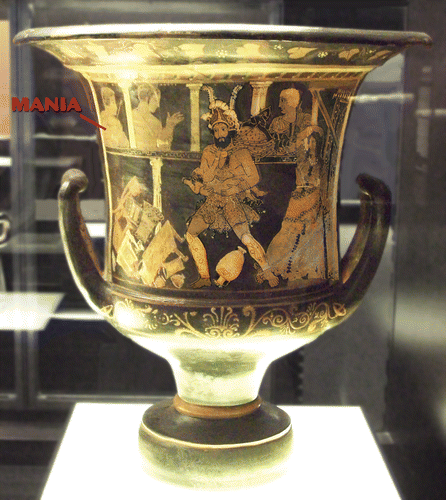An Early Greek Portrayal of a Mad Mind

The image on the vase shown here, signed by the Greek-Sicilian vase painter Asteas (350–320 B.C.E.), is one of western civilization's earliest depictions of insanity. It shows a theater performance of Euripides' Herakles (written 425–416 B.C.E.). The center of the picture features Herakles about to immolate his son as Megara, his wife, tries to flee at the far right. Lyssa (upper left), a Greek goddess of madness also called “Mania,” has driven Herakles into a state of altered consciousness, during which he will murder his children and wife. Herakles would like to blame Hera for his rampage but expresses his own doubt about the gods' influence: “The gods are indifferent to everything but themselves. I return their indifference.” Meagher noted that in this play, the revenge of Hera through the help of Lyssa is a “mythic cover story for the true event(s)” (1, p. 54) and a metaphor for mortal passions.
Snell (2) proposed that the Greek dramatist Euripides was among the first to discover and depict artistically the modern European concept of “mind.” He created human characters motivated by seething emotions and cherished values who made agonizing choices. The portrayal of Herakles emphasizes the primacy of subjective experience, as in the Protagorean aphorism “Man is the measure of all things.” Herakles is tortured by his actions and claims, “I am soaked in blood-guilt, polluted, and contagious” and “My shame for the evil I have done consumes me.” A messenger asks Herakles, “Has the blood of the men you recently killed driven you out of your wits?” (The question suggests insight into the genesis of an illness like today's posttraumatic stress disorder.) Theseus, Herakles' friend, sensitively harnesses the therapeutic value of empathy to help him: “My tears are tears of sympathy for your changed circumstances” and “I have come to share [your] suffering.” He talks Herakles out of committing suicide and uses reality testing in urging his friend not to waste any time threatening the gods. He also helps heal Herakles' insanity by promising compensation through gifts and a change of residence from primitive Thebes to sophisticated Athens.
Euripides' psychological grasp of Herakles diverges considerably from Homer's earlier understanding of human behavior. The heroes of the Trojan War arrive at decisions in a transparent manner, driven only by the prospect of victory, the potential for glory, or the irresistible power of a deity. Homer voiced no skepticism about the omnipotence of the gods. Greek culture of the Homeric Age had little conception of an internal discrete mind. Earlier still, both the Old Testament (Saul, 10th century B.C.E.) and the Ebers Egyptian Papyrus (16th century B.C.E.) allude to severe despondency; but at those times, mental and physical illnesses were hardly distinguished.
1. : Herakles Gone Mad. Northampton, Mass, Olive Branch Press, 2006Google Scholar
2. : The Discovery of the Mind: The Greek Origins of European Thought. Cambridge, Mass, Harvard University Press, 1960Google Scholar



